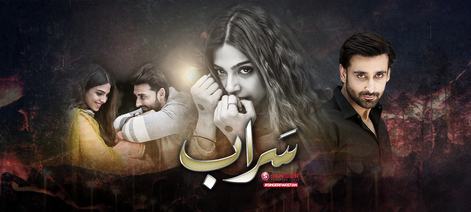When “Saraab” began, the team stated that the show would revolve around a patient with schizophrenia and how Pakistani society, particularly that patient’s loved ones, reacts to her illness and how they handle it. While the show managed to get off-track for several episodes, this drama did largely manage to tell a gripping story with a realistic portrayal of those suffering from mental health disorders and how they are (mis)treated within their own families. Written by Edison Idrees and directed by Mohin Talat, “Saraab” stars Sonya Hussyn, Sami Khan, Nazish Jehengir, Ghana Ali, Kinza Malik and others in supporting roles. So how did the finale fare? Let’s discuss!
Wrapping up the storyline with the sisters, Warda (Ghana Ali) and Namal (Nazish Jehangir) finally have a much-needed chat after it’s revealed that Nadir is the one unable to have children and not Warda. This is a storyline that is also an important one to be told, but the way it has been handled turned it into an absolute mess. Still, it’s wonderful to see the sisters bond and acknowledge their mistreatment of Hoorain, realizing their own hand in her present state. With Namal expecting and Warda playing supportive sister, this story wraps up nicely. However, despite all the complaints about how much screen-time and attention the sisters and their storylines received, there’s a different thought that comes to mind now. Wouldn’t it have been better to have spent more time on Namal and Sufiyaan’s marriage, allowing viewers to witness their bond growing and seeing these two once-toxic individuals, fixated on others, now coming close and understanding the value of their marriage? This is what ultimately happened, but was ultimately treated with zero attention. This would have been preferable to watching Namal attempt to lure Asfandyar to her and plant negative thoughts in Hoorain’s mind. It must be said that both Ghana Ali and Nazish Jehangir act very well in this episode, despite the over-the-top nature their characters have had throughout the show.
Coming to the main storyline, we see Hoorain’s (Sonia Hussyn) mental health taking a turn for the worse after the birth of her child. Believing her mother and in-laws are plotting to give her child to Warda, Hoorain turns hostile and even calls the police on Asfandyar. Following this incident, after witnessing several of Hoorain’s outbursts, Afandyar realizes that he cannot allow Hoorain to live like this anymore and has her placed in the hospital under the care of doctors. This is a difficult situation and, honestly, it’s commendable behavior for Asfandyar to show this level of loyalty. While in theory, individuals promise to be there for each other through better and worse, many abandon one another when “worse” comes into play. And would anyone blame Asfandyar for being fed up after Hoorain’s erratic, dangerous behavior with their son? Asfandyar is a wonderful character, this cannot be stressed enough. He further proves this after Hoorain is admitted to the hospital and he regularly spends his time there with her. Hoorain begins to make a recovery, but after hearing the horror stories of others, she is no longer confident in her ability to live in the real world – and properly care for her child. Her faith in herself has been shattered, and so she puts on a show of a relapse, which deeply hurts Asfandyar. This scene tears one apart, watching Hoorain and Asfand both broken over their life’s condition. Asfand, however, continues to fight for Hoorain even through her performance and makes it clear that he will always be there for her, breaking down her resolve to remain in the hospital. This scene is not only emotional, but it leaves the audience rooting for this wonderful pair to make their life together work.
Fitoor Episode 12: Mehmal Leaves Her Husband And Moves Into Haider’s House
And work it does. As the duo move into the mountains, away from the intrusive world, Hoorain and Afandyar’s marriage seems solid as a rock. However, it’s made apparent at the very end that while Hoorain used to hallucinate about Asfandyar, those hallucinations are now in the form of their son. After Hoorain realizes she’s hallucinating, she shoots Asfandyar a look and the two share a moment of understanding. What’s wonderful about this ending is that it doesn’t rush to create a “solution.” Hoorain isn’t “cured,” because schizophrenia is not a condition that simply goes away – it’s a lifelong battle. But with the right partner, love and support, schizophrenia is a condition that can be monitored and patients can live a relatively normal life. This is what “Saraab” sets out to explain, as is heard in Sami Khan’s final monologue, asking the audience if they would continue to term such individuals as “paagal” or will they now recognize mental health issues and behave with compassion? The ending is thought-provoking and does leave a smile on the face of the viewer.
Overall, while “Saraab” did not manage to garner the sort of viewership it deserved, this drama will be remembered for Asfandyar and Hoorain’s love story, a depiction of true love where loyalty and support overcome all. While the show has not been flawless and has been speckled with problematic characters and situations, the basic, essential storyline of this show remained the drama’s constant strength throughout. Sonia Hussyn’s portrayal of Hoorain casts light on the plight of those suffering from mental health disorders, while Sami Khan’s role as Asfandyar depicts the sort of loving, dedicated partner women like Hoorain need. Sami Khan and Sonia Hussyn are the backbone of this show and they carry it from beginning to end on their shoulders. The show will be remembered for Sami Khan, Sonia Hussyn and the wonderful writing in their track.
